De-amalgamation bill delivers certain uncertainty for residents still campaigning to get their councils back
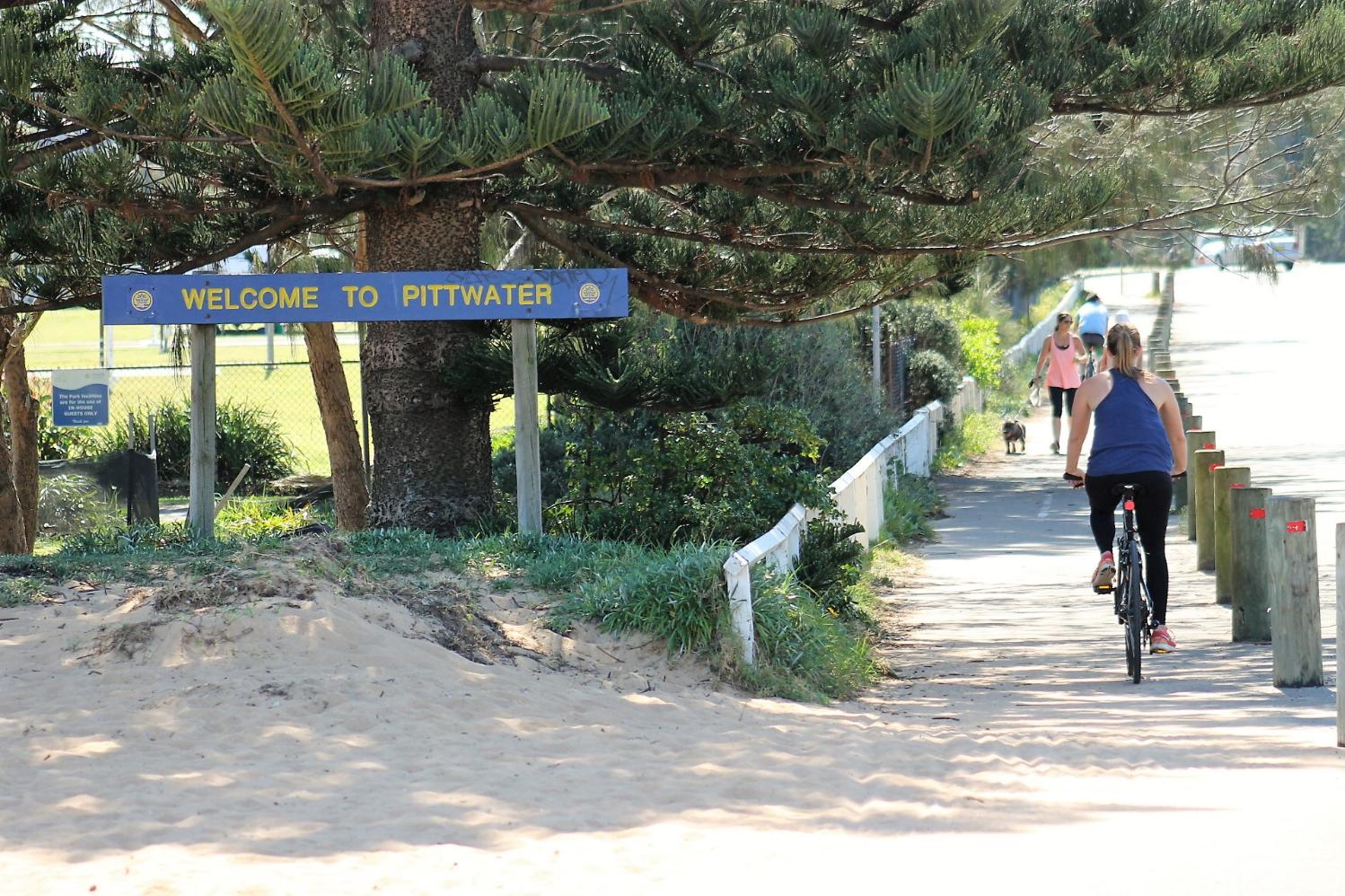
We consider the only future for this area and for the preservation of those ideals and policies for which we stand is to become an independent Shire … the need for this electoral reform has been clearly and sufficiently demonstrated to enable the Government to come to a decision and no longer forestall the issue. Put simply we call upon the Government to put the matter now to the people of A Riding to determine.
Warringah Shire Councillors Robert Dunn and Eric Green, representing A Riding - 1990
Photo: 'Welcome to Pittwater signage at North Narrabeen, where the Pittwater Council LGA commences, in 2013
The Hon. Ron Hoenig, Minister for Local Government, introduced the Local Government Amendment (De-amalgamations) Bill 2024 to the NSW Parliament on Tuesday February 6, stating in a release the NSW Government has introduced the new legislation will remove a major roadblock to council de-amalgamations and ensure local democracy is enshrined in the decision-making process.
'The amendments to the Local Government Act 1993, introduced to Parliament today, will provide a new legal pathway for NSW councils seeking to demerge, including those that already have de-amalgamation proposals under consideration.
The amendments repeal the legally flawed section 218CC of the Act and replaces it with a clear and democratic process.'
This follows years of failed policy making by the former government that left councils across NSW in limbo and failed to take into account the budgetary impacts for NSW taxpayers on proposed de-amalgamations.
Under the changes, councils wishing to de-amalgamate must develop a robust business case upfront. This must consider the financial impacts and council’s ability to fund de-amalgamation, long-term strategic plans and the service delivery capacity of the new demerged councils.
Councils will also be required to undertake community consultation on the business case.
Upon receipt from a Council, the Minister must forward a business case to the NSW Local Government Boundaries Commission.
Following a subsequent independent review by the NSW Local Government Boundaries Commission, the Minister may then approve a constitutional referendum with a compulsory vote, which would require majority support from local electors to proceed with a de-amalgamation.
In addition, the Government’s Bill provides transition arrangements for councils which have already been approved for demerger by the Minister.
The Minister for Local Government Ron Hoenig said:
“The forced amalgamation of NSW councils was a failed and expensive experiment.
“While the NSW Government strongly supports a clear process for councils and communities to exercise their democratic right to pursue de-amalgamation, we also have to be realistic about some of the challenges this brings.
“It’s why one of my main priorities as Local Government Minister has been to find a way to remove the roadblocks posed by the existing demerger process, and give communities the opportunity to decide.
“These amendments the Government has introduced provide a clear path forward for councils wishing to de-amalgamate, providing much more clarity for current and future proposals.
“However, it’s essential that local democracy is enshrined in the decision-making process so that councils and communities are fully informed of the financial and other implications of de-amalgamation.
“The amendments we have introduced are more pragmatic than other legislative proposals being put to Parliament and ensure de-mergers can be effectively managed by councils and that any new councils are financially sustainable.”
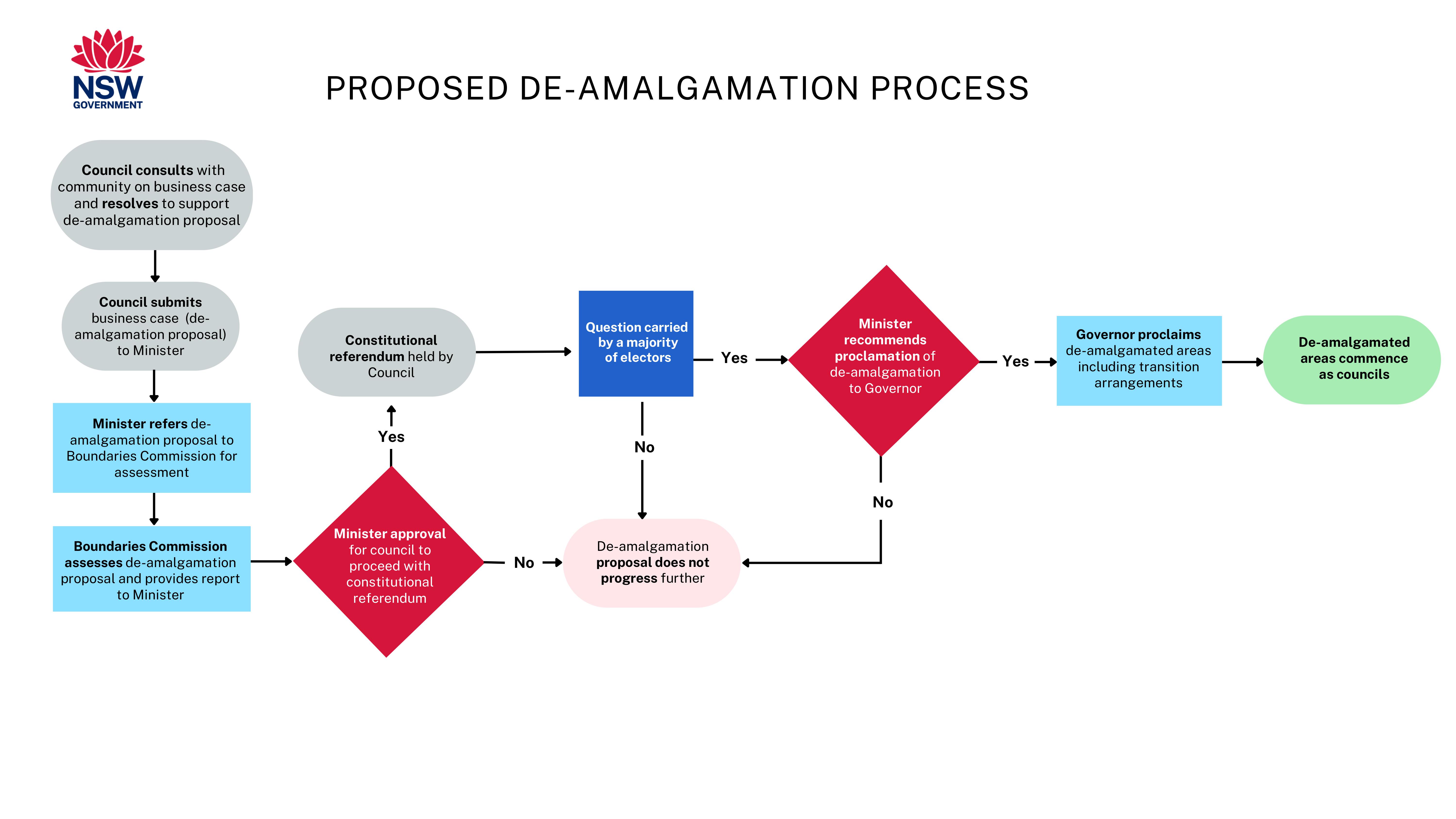
Flow chart of the proposed de-amalgamation process
However, the NSW Government’s decision not to fund council de-amalgamations will make it virtually impossible for councils wishing to de-amalgamate, according to Local Government NSW (LGNSW).
President of LGNSW Cr Darriea Turley said it’s very disappointing that councils should have to carry the financial burden of unravelling amalgamated councils, which were forced on the community by the previous Coalition Government.
It also makes this the provenance of councils, some of which campaigned to merge with those that did not wish to be forcibly amalgamated with them, thereby still maintaining authority over the former councils and able to quash any process by those residents through block voting by aligned councillors.
The Manly-Warringah-Pittwater forced amalgamation is just one of those. Community members have been campaigning since merged with the council they'd only been free of for 20 years since they were subsumed back into what was then called, and still is 'Greater Warringah'.
Further, it was only due to a failure in Pittwater Council (before its forced termination) to follow through on a motion to seek legal advice with a view to joining in that litigation that saw Pittwater residents in their current dire state, as those that did fight on finally heard then Premier Gladys Berejiklian announce the government were abandoning plans to merge Councils in litigation against her government in July 2017. In February that same year the NSW Government walked away from regional council mergers, saying that municipalities challenging the policy in court would no longer be forced to merge.
The Delegate noted that in 2013, the NSW Treasury Corporation (TCorp) found that all three councils (Manly, Warringah and Pittwater) had a ‘Sound’ Financial Sustainability Rating (FSR). The Report also outlined the Independent Pricing and Regulatory Tribunal (IPART) 2015 finding that all three Councils were ‘Not Fit’, as part of its ‘Fit for the Future’ review. While IPART found all three Councils satisfied the financial criteria, the Delegate noted that none of them satisfied the ‘scale and capacity’ criterion, even though bodies such as SHORAC had been working well for a while.
Council demerger campaigners in Pittwater are bitterly disappointed by Labor government proposals revealed last week that will make it harder for smaller councils forcibly amalgamated to go their own way.
Protect Pittwater Association president Simon Dunn said amendments to the Local Government Act proposed by the NSW government will do nothing to restore democracy for minority councils such as Pittwater, amalgamated into the Northern Beaches Council in 2016.
Mr Dunn said Protect Pittwater wrote to Local Government Minister Ron Hoenig last September pointing out that the act was missing:
(a) A mechanism for a former area to be reinstated without a resolution of the new amalgamated Council of which the former area has a minority of Councillors to support such a resolution;
(b) an orderly procedure for assets and staff to be allocated when a former Council area was reinstated.
"The legislation introduced to Parliament this week by Minister Hoenig does nothing to address these two shortcomings and breaks the policy promise Labor took to the last two elections," Mr Dunn said.
"Instead, it perpetuates the endless deferring of decisions between the boundary commission and the minister, with neither being compelled to respect the strong desire of the former council residents to see their beloved Pittwater Council reinstated.
"Protect Pittwater instead urges NSW Labor to amend their proposed legislation to provide for a plebiscite of residents of a former council area - which was already found to be financially viable - to be the only mechanism required to reinstate that former Council.
"The desire for a demerger remains strong in Pittwater, where a statistically reliable survey conducted by the former council before the mergers showed 89 per cent of residents had wanted to remain in our standalone council.
"With the proposed legislation, we would be trapped in a situation where the six councillors representing the former Pittwater, can be outvoted on any issue the other nine."
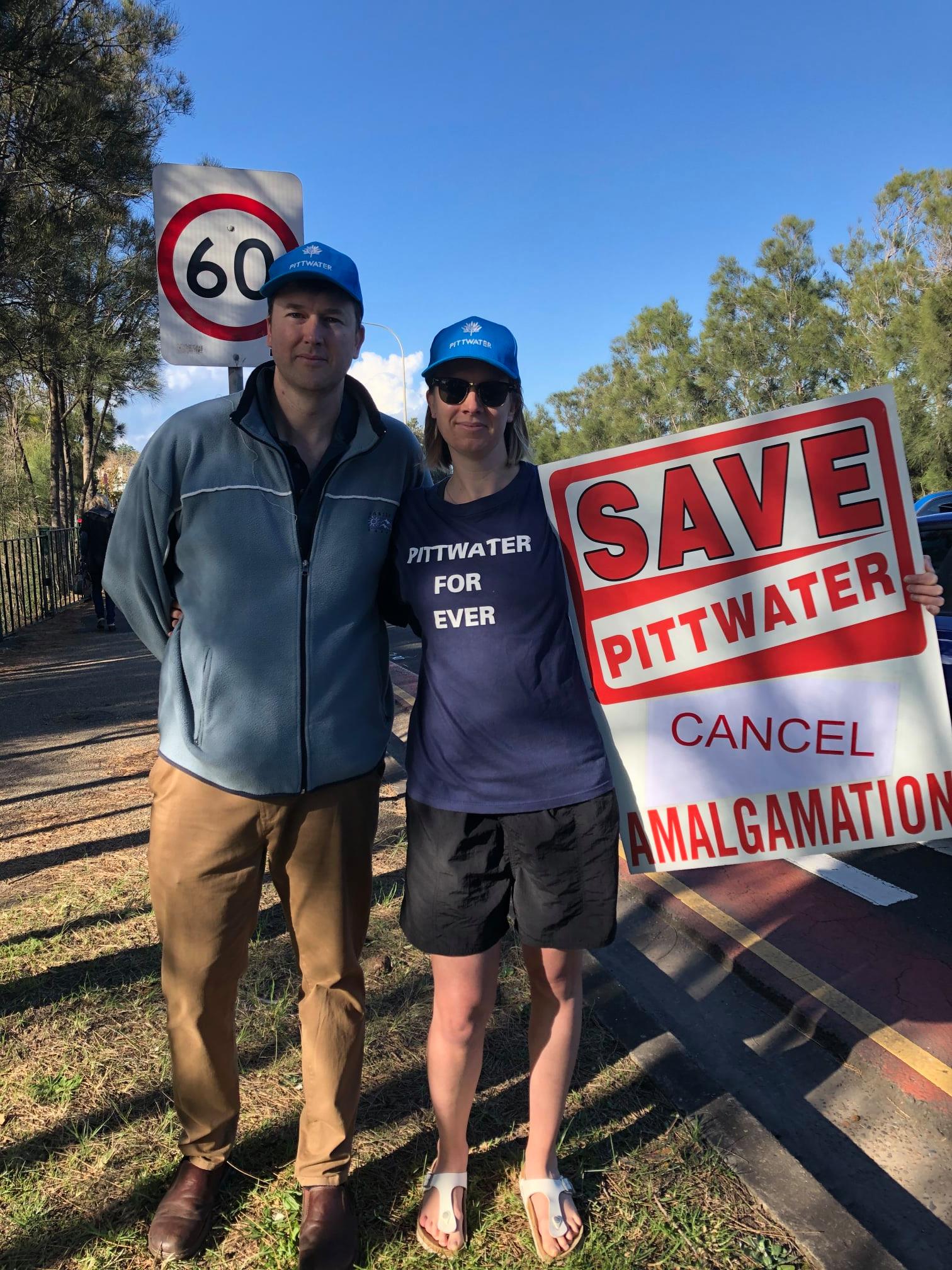
Simon and Hannah Dunn, children of Pittwater's First Mayor, Robert Dunn
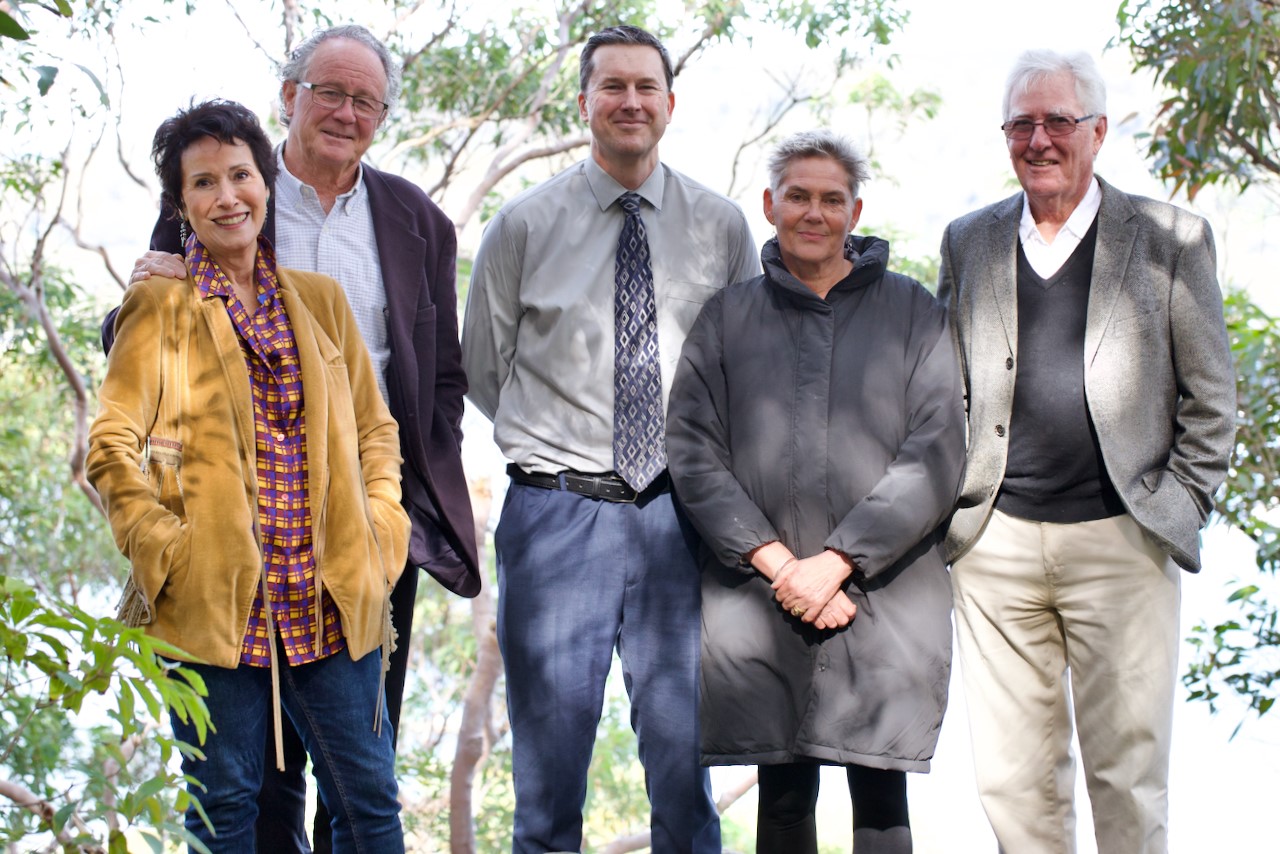
Protect Pittwater Association Committee members June 2023
“Our communities did not want these amalgamations, which were foisted on them, yet now they are being expected to pay to return to the former status quo,” Cr Turley said last week.
“This is sleight of hand by the new State Government, which knows that councils do not have the tens of millions of dollars required to de-amalgamate.
“It’s a cunning public relations exercise by the State Government so that it looks good in the eyes of ratepayers by agreeing to allow de-amalgamations, while at the same time knowing councils cannot foot the bill to carry them out.”
The former government amalgamated 44 councils across the state in May 2016, mostly against the wishes of those local communities.
Small communities who had a local council before being forcibly merged into a larger one still have no certain pathway forward. These communities, such as Pittwater, Guyra and Bombala, have been ignored.
'Despite repeated requests to explain their concerns and assist with legislative change, Mr. Hoenig has refused for over 12 months to meet with Demerge NSW Alliance who represents groups across the State.' DNA said in a statement
Bombala's Grantley Ingram said “Labor’s bill should not be about a path for boundary changes for all councils, for all time. Labor should be putting forward a pathway to fix the complete shambles caused by the forced mergers in 2016”
“The government does have financial liability for fixing the mess, and Labor in opposition promised to do so. By removing the funding clause (218CC) the Minister has effectively walked away from assisting councils to demerge even though the costs will substantially lower than the figures being quoted”
''The Minister claims his bill provides “certainty” for councils. However, the bill removes rights from residents and councils, and hands the decision-making back to the Minister who will have the power to stop any moves towards de-amalgamation.
The Minister does not even have to respect the result of a poll or “referendum”.
''In Minister Hoenig’s Bill smaller communities have to first convince the larger council where they may or may not have many councillors to support them and fund and put a demerger proposal to him.
The bill also stops councils making the decision to conduct a poll about demerger – unless the Minister agrees and only after a business case has been prepared.''
''This may sound like due process however, in the case of the Inner West Council, the Business Case submitted to the NSW Boundaries Commission was written without independent demerger experts and residents being consulted, and it reads like a “stay merged” case.
Labor’s bill is a slight of hand: it must be rejected, or heavily amended, so that democracy is fully restored to communities devastated by the forced amalgamations in 2016.''
Demerge NSW Alliance is calling on the Opposition and the cross bench MPs to ensure a really democratic bill The Local Government Amendment(Deamalgamation Plebiscites)Bill 2023 which allows for binding plebiscites, is passed.
Rochelle Porteous, from Residents for De-amalgamation, said: “The Inner West Council’s Business Case to the NSW Boundaries Commission in 2022 did not present a roadmap for de-amalgamation to the former Marrickville, Leichhardt and Ashfield Councils.
“Instead, it was a case to stay merged.
“Council researchers estimated the real costs of the Inner West de-amalgamation would be closer to $9-$11 million, based on Queensland’s costs of transition management, assets and software.
“The Labor majority in the Inner West Council say that any de-amalgamation would cost more than $150 million over 10 years. Deloittes, which looked at the IWC's Business Case, does not agree. And even Mr Hoenig was forced to admit in Budget Estimates that the high figure was inaccurate,” said Ms Porteous.
“Labor, when in opposition, claimed it opposed the Coalition’s 'Fit For Future' forced amalgamation policy,” Ms Hacking said.
“However, Hoenig’s bill dismantles what little local democracy remains by removing the right for a council to run a poll, such as the IWC did in 2021.
“It also removes government responsibility for the policy failures and makes rate-payers foot the bill.
“Residents for De-amalgamation supports the bill tabled by Dr Amanda Cohn last year, in communities across the state had input, and which has the support from a number of cross bench MPs.
“Dr Cohn’s bill does restore residents and councils’ ability to demerge if a majority deems that better. It does not remove government responsibility for funding the demerger.”
However, as Pittwater Council becoming a reality was decades of work by determined Pittwater residents and even stretches back further than that.
In 'Pittwater Uprising! a secessionist’s view' by Robert Dunn, Pittwater’s first elected Mayor explained:
''The movement for secession, led by Des Creagh of North Avalon, began in 1966. It gathered momentum through the 1980s and 90s, reflecting the growing concerns of residents about the quality of their built and natural environments. Not only was the malapportionment of rate income seen as intrinsically unfair, planning and development decisions which excluded or frustrated the community engendered much passion and activism, leading to the view that secession could be the only remedy.
From this period of agitation and sedition there emerged two committed and tenacious leaders in the persons of Eric Green and Robert Dunn. First elected to Warringah Council, they contended against sustained opposition to represent community aspirations and achieve equity for the residents of A Riding.''
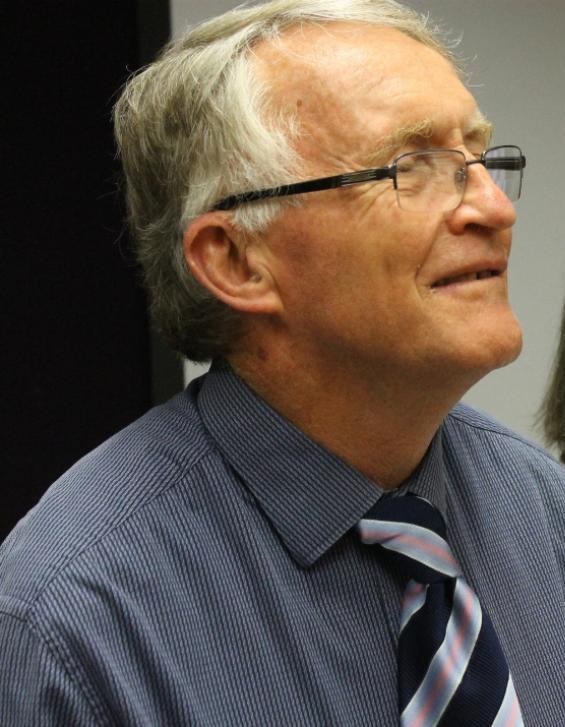
Robert Dunn, ( R.I.P.)
Minutes in the former Warringah Shire Council Meetings record Avalon Beach residents asking that council how they could set up their own council, free from them, back in the 1930s - and being given a non-answer even then.
The noted and real differences in the cultures outlook and communities along the peninsula has been part of this area for almost 100 years. We may like each other, have a great time when we're surf clubs competing in carnivals on the beach, but there are points on which no common ground has ever been found residents reiterate - looking after what makes this place so special; the greenery, not passing inappropriate development in inappropriate places, not putting plastic rubber everywhere, and not locking the community out or riding roughshod over residents through 'consultations' which are in fact statements of intent were part of what caused residents to seek a Pittwater Council then and what keeps Pittwater one community even today.
The 'uprising' seems set to continue.